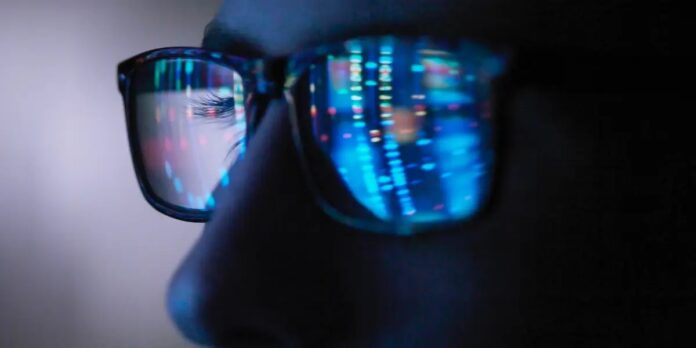
Do you wear glasses? If yes, you are living in a big company – about 69% of the UK population wears glasses to correct different eye defects. This number has increased rapidly over the decade due to digitization, especially during the lockdown when a major portion of the population is either working from home or attending schools online. Digital screens like a laptop, computer, tablet, smartphone, and television emit blue light that is known to be very damaging for the human eyes.
Damaging effects of blue light on your health and vision
Blue light damage is real and needs our immediate attention. These are just some of the several ways in which blue light damages our vision:
- Macular degeneration
The macula is a portion of the eye located at the centre of the retina that stores lutein and zeaxanthin – two antioxidants responsible for absorbing blue light rays passing through them to block them from reaching the light-sensitive retina. As the human body ages, the macula loses its ability to perform its functions.
- Cataract
As blue light emitted by tech screens passes through your eyes, they are absorbed by the lens of the eye, again, to prevent the harmful rays from reaching the retinal screen. This process results in the production of some substances and derivatives that get added to the lens cell contents and gradually turn them yellow opaque.
- Digital Eye Strain
Dry Eye Syndrome or Digital Eye Strain is another eye problem that is extremely prevalent around the UK. It is caused by excessive exposure to high-intensity blue light rays from digital screens. The symptoms include itchy, dry, red, painful, irritated and sore eyes with neck, back and forehead pains.
- Insomnia
As the production of the sleep hormone, melatonin, in our body is decreased in presence of blue light from the sun, it makes us feel awake and active to work during the day. Increased production of melatonin during the night (in absence of blue light) signals our body for sleep time and makes us feel dizzy. However, digital screen blue light during night unnaturally suppresses melatonin production, thus depriving us of sleep.
- Retinal damage
As mentioned above, the retina is sensitive to different colours of the light as it functions to detect them and produce an image. High-intensity blue light induces toxic chemical reactions in the cell contents of this retinal screen as it passes through them. This gradually damages the tissues of this portion of the eye, adversely affecting the vision.
Best foods for boosting eye health
Fatty meats, saturated fats and white food like rice, white bread, pasta and flour tortillas can be the worst foods for eye health. Fresh vegetables and fruits are rich in essential nutrients, antioxidants and other elements that work together to boost eye health and ensure regular working. Here are some foods that can be conveniently included in your daily diet:
- Blueberries
Blueberries are excellent sources of anthocyanins that are capable of lowering inflammation and high blood pressure. They also work to strengthen blood vessels inside the eyes and to prevent any blockages in the arteries that supply blood to the eyes.
- Oranges
Vitamin C is a gem for eye health and is found in abundance in citrus fruits like orange. While the high water content of oranges keeps the body hydrated, the beta-carotene works with other nutrients to enhance the night vision.
- Carrots
Carrots serve as amazing sources for lutein and zeaxanthin – two crucial antioxidants for shielding the eyes against light damage. Beta-carotene in them is also a major precursor for the production of the very essential Vitamin A.
- Bell peppers
Bright coloured bells contain several essential elements needed by the eye. So much so, that one bowlful of bell pepper each day can help you combat all those major eye problems. They store beta-carotene, lutein, zeaxanthin, and Vitamin A.
Prevention methods to save you from blue light damage
While having a nutritious diet is crucial for eye health, some other prevention methods can make things easier for your body:
- Wear blue light glasses
Blue light blocking glasses are an effective tool to prevent any blue rays from entering your eyes by reflecting them back into the air. You can get an anti-blue light coating added on your prescription glasses or varifocal glasses by your optician.
- Keep your eyes hydrated
Dry eyes can be very uncomfortable and painful. Simple measures like drinking more water or blinking oftenly to evenly spread the tears in your eye can keep your eyes lubricated. You can also use artificial tears to moisture your eyes whenever they feel dry. Adding a humidifier beside your table is another way to keep your eyes hydrated by the moist vapours of the air.
- Limit screen time
Prolong screen hours put immense stress on your eyes. Try to minimise digital screen usage by looking for alternatives. You can start by opting for indoor board games instead of online entertainment and switching kindle with paperbacks.
- Adjust your computer
Make sure that your computer or laptop is neither too dim nor too bright according to the lighting of your room. Also, the computer’s centre must lie two to three inches below your eye level. Make sure you sit at an adequate distance from the screen to avoid direct light.
- Maintain eye hygiene
Dust and dirt stuck inside your eyelids can cause redness, pain and itching. Wash your eyes at least twice a day with cold water to get rid of any foreign particles. You can try putting some honey on your water lines before bed. Sticky honey pulls out dust particles while also providing a soothing effect in your eyes. Wash them the next morning with clean water. Also, never ever sleep with your makeup on. Residual makeup acts as a breeding ground for germs.
If you are searching for some good quality reading glasses online, you can check Specscart’s website for a good variety of men’s glasses and women’s glasses at reasonable prices. They also offer free home delivery with a 24-hour dispatch service so you don’t have to live with a blurry vision for more than a day or two.










